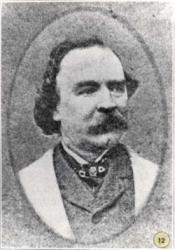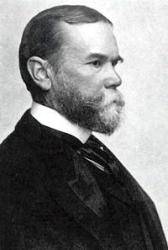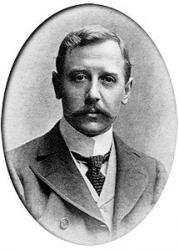Planning worship?
Check out our sister site, ZeteoSearch.org,
for 20+ additional resources related to your search.
- |
User Links
Person Results
‹ Return to hymnal




Export as CSV
John Hullah

1812 - 1884 Hymnal Number: 124 Composer of "BENTLEY" in Worship and Song Born: June 27, 1812, Worcester, England.
Died: February 21, 1884, London, England.
John Hullah
D. C. M. Hume
b. 1884 Person Name: Duncan Hume Hymnal Number: 177 Composer of "[Dare to be brave, dare to be true]" in Worship and Song
D. C. M. Hume
John H. Maunder

1858 - 1920 Hymnal Number: 223 Composer of "THE WHOLE WIDE WORLD" in Worship and Song John Henry Maunder United Kingdom 1858-1920. Born at Chelsea, England,,the son of a carpenter, he attended the Royal Academy of Music. He began his career as a theatre composer, but later specialized in sacred music for the Anglican Church. He became an author and composer, as well as a musician. He was organist at St. Matthew’s, Sydenham (1876-77); St. Paul’s, Forest hill (1878-1879); and at churches in Blackheath and Sutton. He married Ellen Fanny Fulgoux Dakin, and they had a daughter, Winifred. He provided musical accompaniment for concerts in Albert Hall, and, in 1881, conducted the Civil Service Vocal Union. He wrote about 20 church anthems, 10 cantatas, several carols, tunes for around 30 hymns, 19 songs and ballads, 12 services and canticles, two operettas, and six instrumentals. His best known cantata was “Olivet to Calvary”. He was known for his good musical style and great technical facility. His compositions were full of melodic ideas and were written for ease of interpretation. He died at West Brompton, London, England.
John Perry
John H. Maunder
John Hay

1838 - 1905 Hymnal Number: 195 Author of "Defend us, Lord, from every ill" in Worship and Song Hay, John, diplomat and author, born at Salem, Ind., Oct. 8, 1838; graduated at Brown University 1858; admitted to the 111. Bar; was private secretary to Pres. Lincoln; served in the Civil War; member of the Legation at Paris, Madrid, and Vienna, and Ambassador at the Court of St. James. In 1879-81 he was First Assistant Sec. of State, and from 1898 Sec. of State in the Cabinets of Presidents McKinley and Roosevelt, to his death July 1, 1905. His publications included Castilian Days, 1871; and, with J. G. Nicolay, Abraham Lincoln: A History, 10 vols., 1887, &c. In 1871 he also published Pike County Ballads, and in 1890 Poems. Of his poems the following are in common use as hymns:—
1. From Sinai's cloud of darkness. [Law and the Gospel.] This begins with st. ii. of his poem, “Sinai and Calvary," in Poems, 1890, p. 152. Asked for its date and origin, Mr. Hay said: "I wrote the hymn several years ago, because I felt like it. I can say nothing more intelligible than that." It was included iu the New Laudes Domini, N.Y., 1892.
2. Lord, from far-severed climes we come. [Work on for God.] In the summer of 1895, at his summer home at Lake Sunapee, Mr. Hay was asked to write a hymn for the opening of the 15th International Christian Endeavour Convention, at Washington, the following year, but declined on the ground that his verse-writing days were past. But in the following spring he sent this hymn, with the statement that there was no obligation to use it. In his manuscript it is entitled "An Invocation." It was sung at the opening of the Convention of 1896, and again at the Convention on July 4, 1905, when the opening exercises assumed the form of a memorial service, as his body was being borne to the grave. It is in several American collections. In The Methodist Hymnal, N.Y., 1905, it opens with st. ii., “Defend us, Lord, from every ill." The original is in 4 stanzas of 4 lines.
3. Not in dumb resignation. [Submission.] Appeared in 3 stanzas of 8 lines in Harper's New Monthly Magazine, Oct. 1891, and entitled "Thy will be done." Given with alterations in Dr. L. Abbott's Plymouth Hymnal, N.Y., 1894.
Mr. Hay was for some time an office-bearer in the Presbyterian Church of the Covenant, Washington, D.C. [Rev. L. F. Benson, D.D.]
--John Julian, Dictionary of Hymnology, New Supplement (1907)
John Hay
John Edgar Park
1879 - 1956 Person Name: J. Edgar Park Hymnal Number: 93 Author of "We would see Jesus; lo! his star is shining" in Worship and Song J. Edgar Park, until his retirement in 1944, was President of Wheaton College, Massachusetts. He was born in Belfast, Ireland, March 7, 1879 and had his theological studies at New College, Edinburgh, The Royal University, Dublin, and Princeton Theological Seminary. His principal pastorate was in the Second Church of Newton, Congregational, West Newton, Massachusetts, which he served 1926 to 1944, going from there to the Presidency of Wheaton. He is the author of many books, including one of the Lyman Beecher Lectures at Yale. He wrote one of the "Eleven Ecumenical Hymns," entitled "O Christ whose love has sought us out," which were obtained by the Hymn Society for use at the Evanston Assembly (1954) of the World Council of Churches.
--Fourteen New Rural Hymns. Used by permission.
John Edgar Park
Edwin H. Lemare

1865 - 1934 Hymnal Number: 67 Composer of "HAVEN" in Worship and Song Born: September 9, 1865, Ventnor, Isle of Wight, Hampshire, England.
Died: September 24, 1934, Hollywood, California.
Buried: Forest Lawn Memorial Park, Glendale, California.
Lemare received the Goss scholarship at the British Royal Academy of Music (RAM) in 1878, and went on to became a fellow of the RAM and the Royal College of Organists. He played the organ at St. John the Evangelist’s, Brownswood Park; St. Andrew’s Church, and Public Hall, Cardiff, Wales; the Parish Church, Sheffield (1886); Holy Trinity Church, Sloane Street; and St. Margaret’s Church, Westminster. He made a recital tour of Canada and America in 1900, and also toured Europe, Australia, and New Zealand, where he helped design organs for the Auckland Town Hall. He played the organ at the Carnegie Institute in Pittsburgh, Pennsylvania (1902-15), gave recitals at the Panama-Pacific Exposition in San Francisco, California, in 1915, and was municipal organist in San Francisco (1917-21) and Portland, Maine (1921).
Sources:
Colles, Volume II, p. 135
--www.hymntime.com/tch
Edwin H. Lemare
Charles Steggall
1826 - 1905 Hymnal Number: 172 Composer of "DAY OF PRAISE" in Worship and Song
Charles Steggall
W. J. Rooper
Hymnal Number: 177 Author of "Fight then, good soldiers, fight and be brave" in Worship and Song
W. J. Rooper
George Augustus Warburton
1869 - 1929 Person Name: George A. Warburton Hymnal Number: 202 Author of "For all that thou, O Lord, hast wrought" in Worship and Song Warburton, George Augustus, b. in 1859, is the author of the dedication hymn of a place of worship. “O Thou Whose glory shone like fire," in Stryker's College Hymnal, 1904.
--John Julian, Dictionary of Hymnology, New Supplement (1907)
George Augustus Warburton
James Langran
1835 - 1909 Hymnal Number: 134 Composer of "LANGRAN" in Worship and Song James Langran (b. St. Pancras, London, England, November 10, 1835; d. Tottenham, London, England, June 8, 1909) studied organ as a youth but did not receive his Bachelor of Music degree from Oxford until he was forty-nine years old. He had several organist positions–the longest was at St. Paul's Church, Tottenham, England, from 1870 to 1909. He also taught music at St. Katherine's Training College for Schoolmistresses (1878-1909). Music editor of theNew Mitre Hymnal (1875), Langran composed around fifty hymn tunes and contributed several of them to early editions of Hymns Ancient and Modern.
Bert Polman
James Langran


 My Starred Hymns
My Starred Hymns


